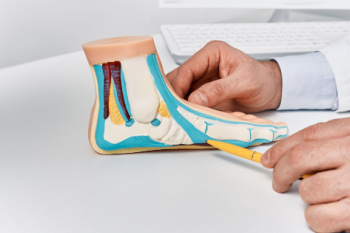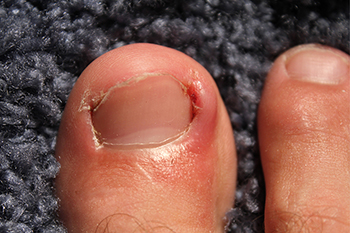Connect With Us
Blog
Items filtered by date: December 2024
Choosing the Right Long Distance Running Shoes

Choosing the right long distance running shoes is essential for comfort and injury prevention. Start by considering your arch type, which can be high, medium, or low. A proper shoe should support your specific arch to promote natural foot alignment. Foot pronation, or how your foot rolls inward while running, is another factor to consider. Overpronation or underpronation may require shoes with extra support or cushioning to correct the motion. Cushioning support is also important for long runs, as it absorbs shock and reduces strain on your joints. Pay attention to shoe size and fit to avoid discomfort. Your shoes should be snug but not too tight, with enough room in the toe box to prevent rubbing. Choosing shoes that suit your individual needs ensures a comfortable and injury-free running experience. If you enjoy this type of running and have endured a foot injury from wearing the wrong types of shoes, it is suggested that you contact a podiatrist who can offer you treatment solutions, in addition to guiding you on what type of shoes to buy.
You should always make sure your running shoes fit properly in order to avoid injury. For more information, contact Paul Hutchison, DPM from Hutchison Foot Clinic. Our doctor can provide the care you need to keep you pain-free and on your feet.
Choosing the Right Running Shoe for Your Foot Type
Improper shoe sizing can cause a myriad of problems for your feet. Shoes that don’t fit you properly can lead to muscular imbalances in your body, which can result in foot, knee, and hip injuries.
Tips for Finding the Right Running Shoe
- Make sure you have a thumb’s width of wiggle room between the end of your longest toe and the front of the shoe.
- There should be little to no slipping at the heel
- Don’t assume your size in one shoe brand will be your size in another
- Do not lace up your shoes too tightly
- Walk around in the store with your new shoes before you buy them
If you have any questions please feel free to contact our our office located in Memphis, TN . We offer the newest diagnostic and treatment technologies for all your foot and ankle needs.
Are Bunions Affecting Your Everyday Life?
Causes and Symptoms of Adult Flat Feet

Adult flat feet occur when the arches of the feet collapse or flatten, leading to a lack of natural arch support. One common cause is excessive body weight, which places extra pressure on the feet and can weaken the arch over time. Foot or ankle injuries, such as fractures or sprains, can also damage the structures supporting the arch, leading to flat feet. Rheumatoid arthritis, or RA, is another contributor, as the inflammation it causes can affect the joints in the feet, leading to a collapse of the arch. As people age, the tendons and ligaments in the feet naturally weaken, making flat feet more common. Symptoms of adult flat feet include foot pain, swelling, and fatigue, particularly after prolonged standing or walking. If you have flat feet, it is suggested that you contact a podiatrist who can help you to manage this condition.
Flatfoot is a condition many people suffer from. If you have flat feet, contact Paul Hutchison, DPM from Hutchison Foot Clinic. Our doctor will treat your foot and ankle needs.
What Are Flat Feet?
Flatfoot is a condition in which the arch of the foot is depressed and the sole of the foot is almost completely in contact with the ground. About 20-30% of the population generally has flat feet because their arches never formed during growth.
Conditions & Problems:
Having flat feet makes it difficult to run or walk because of the stress placed on the ankles.
Alignment – The general alignment of your legs can be disrupted, because the ankles move inward which can cause major discomfort.
Knees – If you have complications with your knees, flat feet can be a contributor to arthritis in that area.
Symptoms
- Pain around the heel or arch area
- Trouble standing on the tip toe
- Swelling around the inside of the ankle
- Flat look to one or both feet
- Having your shoes feel uneven when worn
Treatment
If you are experiencing pain and stress on the foot you may weaken the posterior tibial tendon, which runs around the inside of the ankle.
If you have any questions please feel free to contact our office located in Memphis, TN . We offer the newest diagnostic and treatment technologies for all your foot and ankle needs.
Common Causes of Ankle Injuries in Football

Football and soccer players are prone to various ankle injuries due to the fast-paced, high-impact nature of the sport. A common injury is a lateral ligament sprain, which occurs when the ligaments on the outside of the ankle stretch or tear, often from sudden twists or turns. Osteochondral lesions, which involve damage to the cartilage or bone in the ankle joint, can result from repeated trauma or heavy impacts. Ankle impingement occurs when soft tissues or bone structures in the joint become compressed, leading to pain and restricted movement. Similarly, soft tissue impingement happens when tendons or other tissues become pinched within the ankle, causing inflammation and discomfort. Proper conditioning, warm-up exercises, and wearing appropriate footwear can help prevent these injuries. If you play football or soccer and have sustained a foot or ankle injury, it is suggested that you confer with a podiatrist who can accurately diagnose and treat various foot conditions.
Ankle and foot injuries are common among athletes and in many sports. They can be caused by several problems and may be potentially serious. If you are feeling pain or think you were injured in a sporting event or when exercising, consult with Paul Hutchison, DPM from Hutchison Foot Clinic. Our doctor will assess your condition and provide you with quality foot and ankle treatment.
Common Injuries
The most common injuries that occur in sporting activities include:
- Achilles Tendonitis
- Achilles Tendon Rupture
- Ankle Sprains
- Broken Foot
- Plantar Fasciitis
- Stress Fractures
- Turf Toe
Symptoms
Symptoms vary depending upon the injury and in some cases, there may be no symptoms at all. However, in most cases, some form of symptom is experienced. Pain, aching, burning, bruising, tenderness, tightness or stiffness, sensation loss, difficulty moving, and swelling are the most common symptoms.
Treatment
Just as symptoms vary depending upon the injury, so do treatment options. A common treatment method is known as the RICE method. This method involves rest, applying ice, compression and elevating the afflicted foot or ankle. If the injury appears to be more serious, surgery might be required, such as arthroscopic or reconstructive surgery. Lastly, rehabilitation or therapy might be needed to gain full functionality in the afflicted area. Any discomfort experienced by an athlete must be evaluated by a licensed, reputable medical professional.
If you have any questions, please feel free to contact our office located in Memphis, TN . We offer the newest diagnostic and treatment technologies for all your foot care needs.
What Is Moccasin-Type Athlete’s Foot?

Moccasin-type athlete’s foot is a fungal infection that affects the soles of the feet, often causing dry, itchy, and thickened skin. Unlike the classic form of athlete’s foot, which typically appears between the toes, or a type that causes blisters on the sole of the foot, moccasin-type covers the bottom and sides of the foot, resembling the fit of a moccasin. This type can cause scaling, cracking, and even a rough texture that may extend to the heels. Moccasin-type athlete’s foot is stubborn and can be difficult to treat, as the fungus may penetrate deeper skin layers. People with sweaty feet, compromised immune systems, or a history of foot infections are at higher risk. Treatment often involves topical antifungal creams or, in persistent cases, oral antifungals. To prevent recurrence, keeping feet clean, dry, and wearing breathable shoes is essential. If you have developed what seems to be a fungal infection on your feet, it is suggested that you promptly schedule an appointment with a podiatrist for care.
Athlete’s Foot
Athlete’s foot is often an uncomfortable condition to experience. Thankfully, podiatrists specialize in treating athlete’s foot and offer the best treatment options. If you have any questions about athlete’s foot, consult with Paul Hutchison, DPM from Hutchison Foot Clinic. Our doctor will assess your condition and provide you with quality treatment.
What Is Athlete’s Foot?
Tinea pedis, more commonly known as athlete’s foot, is a non-serious and common fungal infection of the foot. Athlete’s foot is contagious and can be contracted by touching someone who has it or infected surfaces. The most common places contaminated by it are public showers, locker rooms, and swimming pools. Once contracted, it grows on feet that are left inside moist, dark, and warm shoes and socks.
Prevention
The most effective ways to prevent athlete’s foot include:
- Thoroughly washing and drying feet
- Avoid going barefoot in locker rooms and public showers
- Using shower shoes in public showers
- Wearing socks that allow the feet to breathe
- Changing socks and shoes frequently if you sweat a lot
Symptoms
Athlete’s foot initially occurs as a rash between the toes. However, if left undiagnosed, it can spread to the sides and bottom of the feet, toenails, and if touched by hand, the hands themselves. Symptoms include:
- Redness
- Burning
- Itching
- Scaly and peeling skin
Diagnosis and Treatment
Diagnosis is quick and easy. Skin samples will be taken and either viewed under a microscope or sent to a lab for testing. Sometimes, a podiatrist can diagnose it based on simply looking at it. Once confirmed, treatment options include oral and topical antifungal medications.
If you have any questions, please feel free to contact our office located in Memphis, TN . We offer the newest diagnostic and treatment technologies for all your foot care needs.
Causes and Prevention of Ingrown Toenails

An ingrown toenail occurs when the edge of the toenail grows into the surrounding skin, causing pain, swelling, and redness. This condition most commonly affects the big toe but can occur on any toe. The main causes of ingrown toenails include improper nail trimming, where the nails are cut too short or rounded at the edges, and wearing tight or ill-fitting shoes that put pressure on the toes. Injuries to the toe, such as stubbing, can also lead to an ingrown toenail. Prevention involves trimming toenails straight across to avoid sharp edges that can dig into the skin. Wearing shoes that fit properly and allow for adequate toe room is also essential. Keeping the feet clean and dry, and avoiding excessive pressure on the toes, can further help prevent ingrown toenails and reduce the risk of infection. If you have an ingrown toenail, it is strongly suggested that you promptly contact a podiatrist who can offer you appropriate treatment solutions.
Ingrown toenails may initially present themselves as a minor discomfort, but they may progress into an infection in the skin without proper treatment. For more information about ingrown toenails, contact Paul Hutchison, DPM of Hutchison Foot Clinic. Our doctor can provide the care you need to keep you pain-free and on your feet.
Ingrown Toenails
Ingrown toenails are caused when the corner or side of a toenail grows into the soft flesh surrounding it. They often result in redness, swelling, pain, and in some cases, infection. This condition typically affects the big toe and may recur if it is not treated properly.
Causes
- Improper toenail trimming
- Genetics
- Improper shoe fitting
- Injury from pedicures or nail picking
- Abnormal gait
- Poor hygiene
You are more likely to develop an ingrown toenail if you are obese, have diabetes, arthritis, or have any fungal infection in your nails. Additionally, people who have foot or toe deformities are at a higher risk of developing an ingrown toenail.
Symptoms
Some symptoms of ingrown toenails are redness, swelling, and pain. In rare cases, there may be a yellowish drainage coming from the nail.
Treatment
Ignoring an ingrown toenail can have serious complications. Infections of the nail border can progress to a deeper soft-tissue infection, which can then turn into a bone infection. You should always speak with your podiatrist if you suspect you have an ingrown toenail, especially if you have diabetes or poor circulation.
If you have any questions, please feel free to contact our office located in Memphis, TN . We offer the newest diagnostic and treatment technologies for all your foot care needs.

